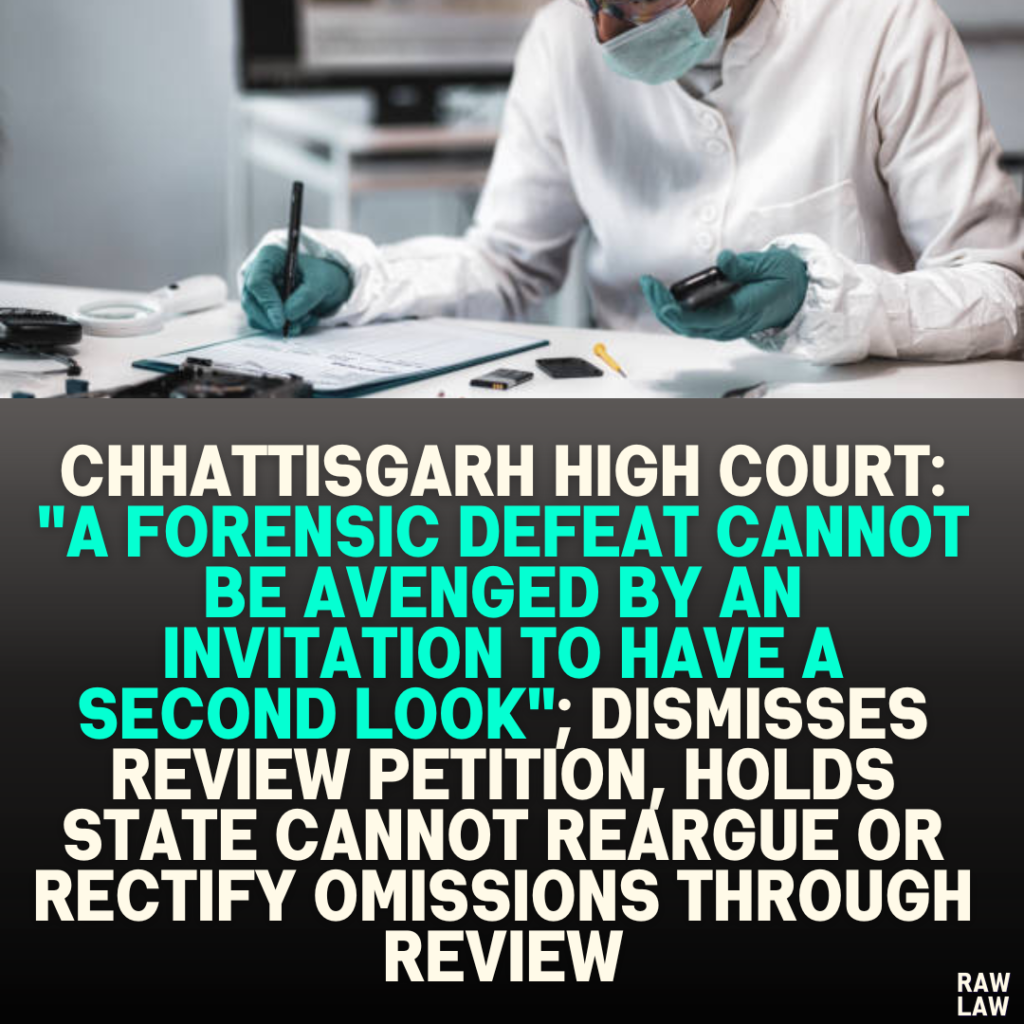Court’s Decision
The High Court of Chhattisgarh dismissed the review petition filed by the State against its earlier decision in WPS No. 6205/2019. The court ruled that the review petition lacked merit, as it neither presented new evidence nor demonstrated any error apparent on the face of the record. It reaffirmed the principle that review petitions cannot serve as a substitute for appeals or an opportunity to reargue settled matters.
Facts
- The writ petitioner was appointed as an Auxiliary Nurse Midwife (ANM) on probation for two years.
- Before the probation period expired, the petitioner’s services were terminated on the grounds that more candidates were appointed than the sanctioned number of posts.
- The petitioner challenged the termination, arguing that she was appointed through a proper recruitment process against a vacant and sanctioned post.
- The petitioner contended that the termination violated principles of natural justice, as no inquiry was conducted and no reason was assigned.
- The court, in its earlier decision, found the termination unlawful and directed the State to act in accordance with law.
Issues
- Legality of Termination: Was the removal of the writ petitioner during her probation justified?
- Review Petition Grounds: Did the grounds raised in the review petition warrant a reconsideration of the court’s earlier decision?
Petitioner’s Arguments
The writ petitioner opposed the review petition on the following grounds:
- Validity of Appointment: She was appointed against a sanctioned and vacant post after fulfilling all procedural requirements, including advertisement, examination by VYAPAM, and merit-based selection.
- Unlawful Termination: The State terminated her services without conducting an inquiry or assigning reasons, violating the Chhattisgarh Civil Services (General Conditions of Service) Rules, 1961.
- Original Grounds: The State’s arguments in the review petition were not raised during the writ proceedings, making them inadmissible.
Respondent’s Arguments
The State sought review of the earlier order, asserting:
- Probationary Nature: The petitioner was appointed on a probationary basis, allowing termination without inquiry.
- Error in Appointments: The termination arose from an administrative error in appointing more candidates than the sanctioned posts.
- Omissions in Original Arguments: The State argued that its failure to raise certain points during the writ petition proceedings justified a review.
Analysis of the Law
The court examined the principles governing review petitions under Section 114 and Order 47 Rule 1 of the Civil Procedure Code (CPC). It emphasized:
- Scope of Review: A review petition is limited to correcting errors apparent on the face of the record or considering new and important evidence not available during the original proceedings.
- Prohibited Grounds: Re-argument of decided matters or presenting new grounds omitted earlier are not permissible grounds for review.
Key Judgments Referenced:
- M/s Northern India v. Lt. Governor of Delhi (1980): A forensic defeat does not justify a review unless the original view is manifestly distorted.
- Parison Devi v. Sumitri Devi (1997): Errors requiring reasoning are not self-evident and do not qualify as reviewable errors.
- M/S Shanti Conductors v. Assam SEB (2020): Review petitions cannot be used to re-litigate settled matters.
Precedent Analysis
The court relied on several landmark cases to underline the limited scope of review:
- Sajjan Singh v. State of Rajasthan (1965): A review is not meant for fresh consideration of the case.
- Beghar Foundation v. K.S. Puttaswamy (2021): A change in law or subsequent judgment does not warrant a review.
- Satyanarayan Laxminarayan v. Mallikarjun Bhavanappa (1960): Errors apparent on the face of the record are required for review, not errors discernible through reasoning.
Court’s Reasoning
- New Grounds Raised: The State attempted to introduce grounds in the review petition that were not argued during the writ petition proceedings. The court deemed this impermissible.
- Principles of Natural Justice: The petitioner’s termination violated principles of natural justice as it was executed without an inquiry or opportunity to be heard.
- Misuse of Review Petition: The court noted that the State was attempting to reargue the case under the guise of a review petition, which is not permissible.
- No Error Apparent: The court found no error apparent on the face of the record in its original decision that would warrant a review.
Conclusion
The court dismissed the review petition, finding it to be misconceived. It held that the State could not reargue its case or rectify omissions in its earlier submissions through a review petition.
Implications
- Limits on Review Petitions: The judgment reaffirms that review petitions cannot serve as appeals in disguise or an opportunity to address omissions made in earlier arguments.
- Natural Justice in Termination: The case underscores the importance of adhering to procedural fairness, even in probationary appointments.
- Finality of Judgments: The court highlighted the principle of judicial finality, restricting reviews to cases of clear and apparent errors.
By this judgment, the High Court sends a strong message about the limited purpose and scope of review petitions while upholding procedural fairness in employment matters.
